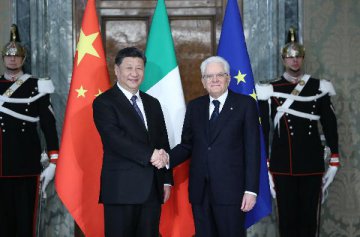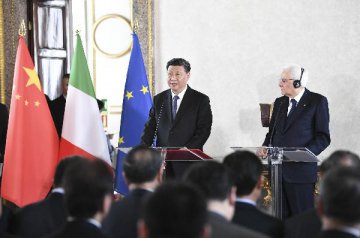by Eric J. Lyman
ROME, April 10 (Xinhua) -- Italy could be setting itself up for another clash with the European Commission after the Italian government outlined a plan it says will keep electoral promises aimed at boosting economic growth but do little to reduce one of the world's highest levels of public debt.
Italy's government this week released its new Economic and Financial Document, best known as the DEF, including updates for the current year -- for example, it estimates the 2019 budget deficit will total 2.4 percent of the country's gross domestic product, higher than the 2.04-percent limit agreed to in December -- as well as the first formal clues about the country's 2020 budget plans.
"What is interesting is that the DEF changes the previous estimates for 2019, admitting the deficit will be higher, growth slower, and so on," Francesco Daveri, a macroeconomist and the head of the business administration program at the SDA Bocconi School of Management in Milan, told Xinhua. "But it leaves the predictions for 2020 and 2021 unchanged."
That means it estimates the 2020 budget deficit will be the equivalent of 2.1 percent of the country's gross domestic product even though the 2019 adjustments mean the gross domestic product will be smaller than previously expected at the end of this year.
"They also leave certain aspects out of the final calculations," Daveri said. "For example, they say they will not raise the value-added tax, something none of the major political parties want. But they leave the revenue from the higher value-added tax in the calculations. Without that revenue, the 2.1-percent deficit becomes 3.1-percent."
Daveri went on: "They also want to institute a flat-tax for companies and individuals but do not reflect that. If they apply the flat tax with no further adjustments, then the 3.1-percent deficit becomes a 4.1-percent deficit."
If that happens, it will dramatically add to an already massive amount of public debt, which, at 133 percent of the country's gross domestic product, is the second highest in the European Union, better only than Greece.
Gian Franco Gallo, a political affairs analyst with Milan's ABS Securities, called the document "a political DEF" because of next month's elections for European Parliament. Gallo said he thought the final 2020 budget revealed at the end of the year would have limited connections with the draft released this week.
"This is a DEF aimed at satisfying supporters of the political parties in the government," Gallo said in an interview. "The main goal is to drum up enthusiasm among voters, or at least to avoid pushing potential voters away."
Gallo said the European Parliament vote was not only likely to shift the balance of power within the Italian government, but also to dramatically change the makeup and the priorities of the European Commission that will ultimately have to give its approval to Italy's budget plan.
"Once the dust settles from the European elections, we'll be able to make a more educated guess about how Italy's budget situation will play out," Gallo said.
For his part, Daveri said there is value to an early DEF like the one released this week, even if the context is likely to change by the time the 2020 budget is finalized.
"This is like a marker, an indication of what the government's goals are," Daveri said. "It's a starting point in a process that will last until the end of the year."






















Latest comments